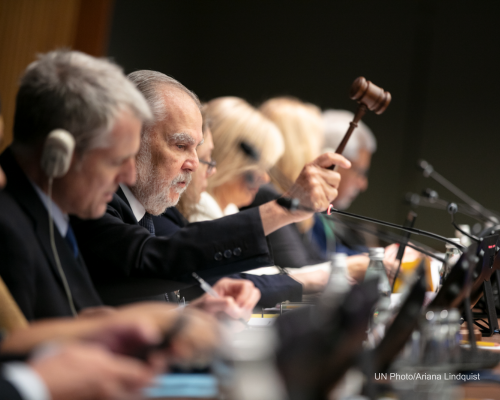
International Law - Webinar track - Fall 2025
This course aims to provide participants with a comprehensive knowledge of the fundamentals of International Law that is necessary to understand the importance, role and purpose of international law in the contemporary legal order and international community.
The subject of international law brings a lot of concepts to mind, from war and settlement of disputes between States, protection of the environment, responsibilities and obligations, to human rights protection between citizens, refugees of different States and corporations. Globalization has forced us to interact with each other, making it essential to have common rules to guide and sustain relationships (of trade, investment, technology, etc.) between individuals and States from different regions and continents. Now, many of domestic laws are highly influenced and molded by the rules of international law. International law provides mandatory principles, norms and rules that regulate the relations between States as well as with other non-State actors, like international organizations and individuals.
This extended edition of UNITAR's traditional online course offers participants the chance to ask questions to a high level expert during a Q&A webinar.
At the end of this self-paced course, you will be able to:
- Define international law and its various functions in States.
- Explain the interaction between international and national law.
- Distinguish between sources of international law and describe the relationship between them.
- Identify subjects in international law and compare the responsibilities between State and non-State actors.
- Identify international dispute settlement mechanisms and apply basic international law principles.
The course combined 30 hours of self-study with a 2 hour Q&A webinar taught by a high-level expert.
The course consist of three modules
- Module 1 describes the scope, functions and importance of international law. It identifies the sources of international law and its relations, describes the concept of legal personality and provides examples of the role of individuals, States and international organizations in international law.
- Module 2 describes the interaction between international and national law and international law and international organizations. It identifies the principles of State responsibility, explains the rules of interpretation in relations to conflicting obligations and discusses the concept and scope of jurisdiction in international law.
- Module 3 describes the principles governing States and the rules of international law in relations to use of force. It explains procedures/measures available for dispute settlement, provides examples of some dispute settlement mechanisms, identifies means, techniques and procedures to ensure compliance with international law, and distinguish the roles of international and domestic courts in the settlement of disputes in international law.
This course promotes an interactive approach through lessons and multimedia material, stimulating critical thinking. Each module has its own learning objectives, as well as interactive online lessons, which guide participants through the contents. The lessons are also available in PDF format so participants can work offline. Contents and activities are practice-oriented and under a self-assessment approach, so participants will learn through practical examples and assignments associated with research and case scenarios. This experience will be supported by the UNITAR team, additional resources and material, and visuals such as infographics and videos.
In addition to the online course, a Q&A webinar will take place on 19 September 2025 from 10:00 to 12:00 Geneva time.
Government officials, international civil servants, lawyers, judges, NGO representatives, academics, law students, private sector professionals in the field of international law and international organizations
Certificates: Participants who successfully meet the minimum passing requirements at the end of the course will receive a UNITAR Certificate of Completion.
Technical Requirements:
- The course is delivered through UNITAR’s Virtual Learning Environment and participants will require a reliable internet connection throughout its duration;
- The Q&A webinar is delivered via the platform Zoom and participants will require a reliable Internet connection.

